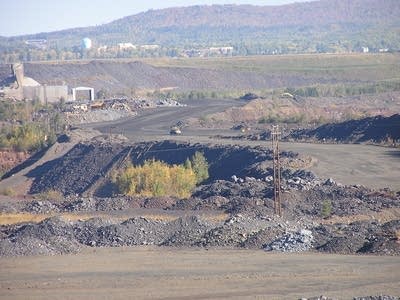China boom continues on the Range - but for how long?
Go Deeper.
Create an account or log in to save stories.
Like this?
Thanks for liking this story! We have added it to a list of your favorite stories.

Eveleth is a town with just a couple of stop-lights, and a single grocery store. A block or so from the world's biggest hockey stick downtown, you'll find city hall, and Tiffany Anderson. She's Eveleth's Economic Development director.
"I think that everyone's optimistic, and to speak from the new word on the street, business is beautiful," Anderson says.
Quite a contrast to what she might have said three years ago.

That's when EVTAC closed, putting 400 people out of work. It was a big blow for a region still reeling from the loss of 1,300 jobs at LTV Steel in Hoyt Lakes two years earlier. Eveleth was facing economic devastation.
Turn Up Your Support
MPR News helps you turn down the noise and build shared understanding. Turn up your support for this public resource and keep trusted journalism accessible to all.
Tony Barrett, an economist with the College of St. Scholastica in Duluth sets the scene.
"It's grim," Barrett says. "These are very well paying jobs. A mine worker there could make $60,000 to $70,000 a year. You don't replace jobs like that in small towns, anywhere in America. And that's what Eveleth was facing."
A mine worker there could make $60,000 to $70,000 a year. You don't replace jobs like that in small towns, anywhere in America.
But Eveleth's obituary was premature. A new was wind blowing, all the way from China, where unprecedented growth was fueling a massive demand for iron and steel.
"Out of the blue comes Cleveland Cliffs, with a Chinese partner," Barrett says. "And they buy the plant at fire sale prices and reopened it, with a new union contract, lower wages, and it's now one of the more efficient producers. It's really kind of a miracle."
Cleveland Cliffs owns 70 percent, and China's Laiwu Steel owns the rest. Cleveland Cliffs loads a third of the company's output into ships for the long haul to Shandong Province, China.

Todd Roth manages United Taconite from a plain one story office building at the pellet plant south of Eveleth. It's clearly a lean operation. There's no one to screen phone calls or greet visitors at the door. But there's nothing Chinese about the place either, beyond the name Laiwu on the sign at the gate. Roth says the company's Chinese partners leave the management to Cleveland Cliffs.
"I guess I would call them a silent partner," Roth says. You know, they help pay our operating expenses. Aside from that, they come here probably once a year. Twice would be the most. We also see them around December when we do our budget preparations."
But observers agree, the Chinese influence could be short lived in middle America.
Joe Strlekar is Vice President of the local United Steelworkers. Strlekar sees the Chinese market as a welcome anomaly: a temporary hedge against the typical up and down cycles of the steel business.

"The expansion of the Chinese economy, I guess you could say, was the catalyst that got us going again," says Strlekar. "But it's not what's keeping us going."
That would be the need for pellets in domestic steel blast furnaces. And Strlekar thinks Evtac would have reopened, even without direct Chinese investment.
"We have a good ore body," Strlekar says. "The plant was in fairly good shape. I guess you could say the Chinese economy still would have had something to do with us reopening, because of the need for iron ore worldwide, but not necessarily would it have had to have been a Chinese ownership."

For now, the Chinese economy continues sucking in resources, like taconite ore. Plant Manager Todd Roth says United Taconite is producing all out, some five-million tons of pellets a year.
"I guess what I can tell you for 2007 is we're looking to make as much as we can," Roth says. "So, that is continuing. For how long I'm not even going to guess."
But his employer may be seeing the writing on the wall. Cleveland Cliffs is investing in iron mines in Australia and Brazil. Both are considered more likely to feed the Chinese steel market in the future. Eventually, Roth says, United Taconite's fortunes will rely less on the Chinese market, and more on the fortunes of the domestic steel industry.




